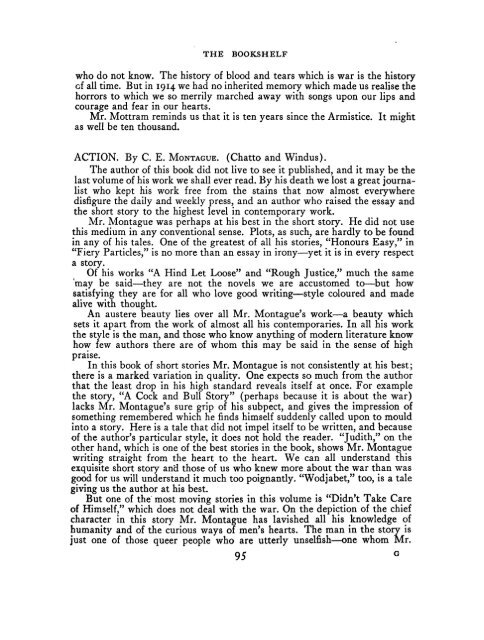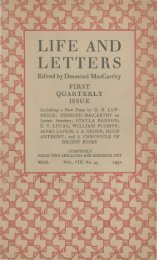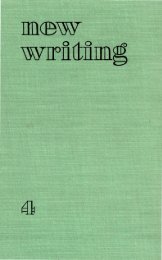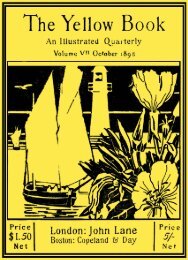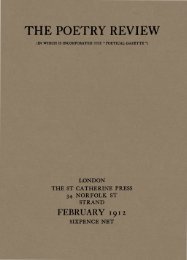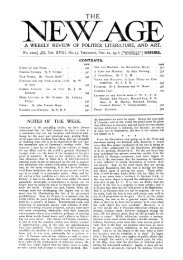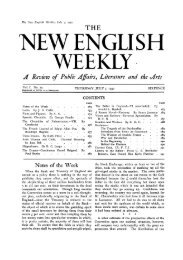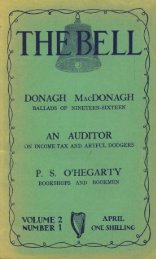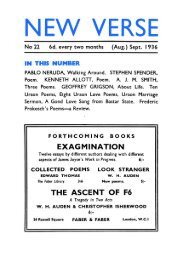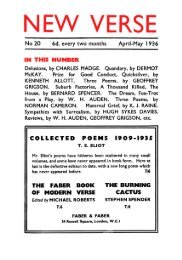Vol. VI No. 1 - Modernist Magazines Project
Vol. VI No. 1 - Modernist Magazines Project
Vol. VI No. 1 - Modernist Magazines Project
You also want an ePaper? Increase the reach of your titles
YUMPU automatically turns print PDFs into web optimized ePapers that Google loves.
THE BOOKSHELF<br />
who dp not know. The history of blood and tears which is war is the history<br />
of all time. But in 1914 we had no inherited memory which made us realise the<br />
horrors to which we so merrily marched away with songs upon our lips and<br />
courage and fear in our hearts.<br />
Mr. Mottram reminds us that it is ten years since the Armistice. It might<br />
as well be ten thousand.<br />
ACTION. By C. E. MONTAGUE. (Chatto and Windus).<br />
The author of this book did not live to see it published, and it may be the<br />
last volume of his work we shall ever read. By his death we lost a great journalist<br />
who kept his work free from the stains that now almost everywhere<br />
disfigure the daily and weekly press, and an author who raised the essay and<br />
the short story to the highest level in contemporary work.<br />
Mr. Montague was perhaps at his best in the short story. He did not use<br />
this medium in any conventional sense. Plots, as such, are hardly to be found<br />
in any of his tales. One of the greatest of all his stories, "Honours Easy," in<br />
"Fiery Particles," is no more than an essay in irony—yet it is in every respect<br />
a story.<br />
Of his works "A Hind Let Loose" and "Rough Justice," much the same<br />
'may be said—they are not the novels we are accustomed to—but how<br />
satisfying they are for all who love good writing—style coloured and made<br />
alive with thought.<br />
An austere beauty lies over all Mr. Montague's work—a beauty which<br />
sets it apart from the work of almost all his contemporaries. In all his work<br />
the style is the man, and those who know anything of modern literature know<br />
how few authors there are of whom this may be said in the sense of high<br />
praise.<br />
In this book of short stories Mr. Montague is not consistently at his best;<br />
there is a marked variation in quality. One expects so much from the author<br />
that the least drop in his high standard reveals itself at once. For example<br />
the story, "A Cock and Bull Story" (perhaps because it is about the war)<br />
lacks Mr. Montague's sure grip of his subpect, and gives the impression of<br />
something remembered which he finds himself suddenly called upon to mould<br />
into a story. Here is a tale that did not impel itself to be written, and because<br />
of the author's particular style, it does not hold the reader. "Judith," on the<br />
other hand, which is one of the best stories in the book, shows Mr. Montague<br />
writing straight from the heart to the heart. We can all understand this<br />
exquisite short story and those of us who knew more about the war than was<br />
good for us will understand it much too poignantly. "Wodjabet," too, is a tale<br />
giving us the author at his best.<br />
But one of the most moving stories in this volume is "Didn't Take Care<br />
of Himself," which does not deal with the war. On the depiction of the chief<br />
character in this story Mr. Montague has lavished all his knowledge of<br />
humanity and of the curious ways of men's hearts. The man in the story is<br />
just one of those queer people who are utterly unselfish—one whom Mr.<br />
95 G


